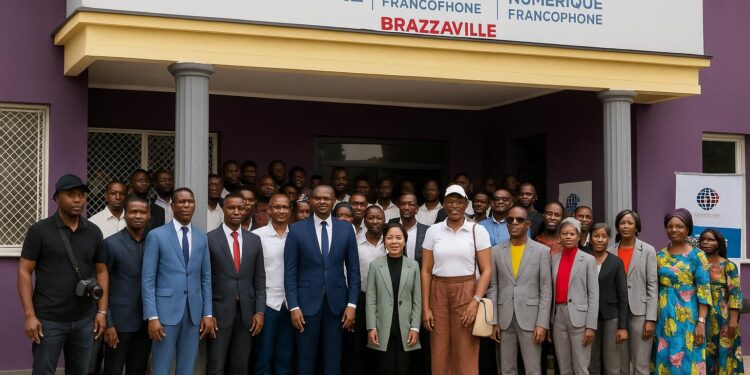London’s Flagship Scholarship Meets Brazzaville
Inside a packed lecture hall at Marien-Ngouabi University on 13 August 2025, British Ambassador Alyson King outlined how the Chevening programme can “transform careers and societies alike” for the 2026-2027 academic year (British Embassy Brazzaville, media briefing, Aug. 2025). The event launched a vigorous nationwide roadshow.
Soft Power Through Academic Exchange
Founded in 1983, Chevening is a pillar of the United Kingdom’s soft-power toolkit. By financing a one-year master’s degree, return airfare and monthly living stipend, London cultivates alumni who often assume influential posts in government, business and civil society across 160 eligible states (Chevening Secretariat 2024 statistics).
Terms Designed to Spur Local Impact
Successful applicants undertake a short professional placement in Britain, then commit to spend at least two years back home. The clause, Ambassador King argued, guarantees “knowledge circulation rather than brain drain,” matching Congo’s development priorities with British foreign policy goals in education and governance.
Eligibility and Application Timeline
Candidates must hold a bachelor’s degree, display two years of professional experience, demonstrate English proficiency and select up to three UK universities. Online submissions, entirely in English, run from 5 August to 7 October 2025 at noon GMT. Artificial-intelligence chat support now guides applicants in real time, a novelty introduced last cycle.
Rigorous Yet Open Selection Process
No formal quota restrains Congolese hopefuls, according to embassy education adviser Ruth Kalanga. Essays answering motivation questions carry significant weight; final decisions rest exclusively with the Chevening Secretariat in London. “Our role is promotion, not adjudication,” she told journalists, emphasising transparency and meritocracy.
Francophone Focus This Season
Historically, francophone Africa has supplied a modest share of Chevening scholars. To redress the gap, the British mission is conducting French-language webinars, radio segments and partnerships with alumni associations in Brazzaville, Pointe-Noire and Dolisie. Kalanga calls the strategy “a more assertive outreach to quality francophone talent.”
Aligning With Congo’s Human-Capital Agenda
Brazzaville’s National Development Plan 2022-2026 prioritises skills transfer in digital technology, energy and public administration. Congolese officials quietly welcome scholarships that funnel expertise home. A senior Ministry of Higher Education source described Chevening as “complementary to state efforts without fiscal burden,” speaking on background to this review.
Fields Favoured By Recent Alumni
Recent Congolese Cheveners have pursued public health at the London School of Hygiene & Tropical Medicine, petroleum law at the University of Aberdeen and climate finance at SOAS. Those tracks mirror sectors earmarked for diversification in Congo’s post-COVID recovery blueprint (UNDP Congo economic note, 2024).
Networking Beyond the Classroom
Chevening’s selling point extends beyond academic credentials. Alumni join a 60,000-member network spanning ministers, journalists and entrepreneurs. “You find yourself seated next to future cabinet secretaries,” recalled 2019 Congolese scholar Prisca Mabiala during a virtual alumni fireside, noting collaborations that followed her return to Pointe-Noire.
Funding Certainty Amid Global Cuts
While some donor programmes face austerity, the UK Foreign, Commonwealth & Development Office ring-fenced Chevening’s £100 million budget in the 2025 Spending Review. Analysts see the decision as an affirmation that talent diplomacy remains a British priority despite domestic fiscal pressures (Institute for Government brief, Feb. 2025).
Balancing National Ambitions and Return Clause
Observers occasionally question whether return obligations hinder career trajectories. Ambassador King counters that alumni rarely struggle to reintegrate. “Employers value international exposure married to commitment at home,” she said, citing a 94 percent employment rate for returning scholars within six months (Chevening Alumni Survey 2023).
Digital Tools Lower Barriers
The new AI chatbot on the application portal fields technical queries in multiple languages, from document uploads to visa timing. For applicants outside major cities, this feature mitigates connectivity and information gaps, an issue previously flagged by civil-society monitors in the Central African sub-region.
Gender and Inclusion Targets
Chevening’s diversity framework aspires to gender parity by 2030. Last year, women constituted 49 percent of awardees worldwide. In Congo, the embassy partners with women-led NGOs to encourage applications in STEM, where female representation remains below 20 percent according to UNESCO Institute for Statistics, 2024.
Security of Stay in the UK
Immigration rule adjustments post-Brexit have not affected Cheveners, whose visas fall under the Temporary Worker—Government Authorised Exchange category. Scholars retain access to the National Health Service and may bring dependants if programme length exceeds six months, benefits outlined in updated Home Office guidance published April 2025.
Long-Term Diplomatic Dividends
British officials note that alumni often act as informal interlocutors, smoothing trade talks or cultural exchanges later in their careers. A former Congolese Chevener now serving at the Ministry of Foreign Affairs described the network as “a lifelong hotline to Whitehall,” fostering dialogue on issues from climate finance to maritime security.
Preparing Competitive Applications
Advisers urge prospective scholars to link proposed study fields to Congo’s national priorities, quantify leadership experience and secure robust references early. Kalanga recommends drafting essays over several weeks. “Quality shows in reflection,” she said, reminding students that the average acceptance rate hovers near three percent globally.
A Window of Opportunity
With the application portal opening in August, Congolese professionals have a brief, clear window to position themselves for an intensive year in the United Kingdom and an influential return home. For many, the exercise may prove a first step toward shaping Congo’s next development chapter.












































